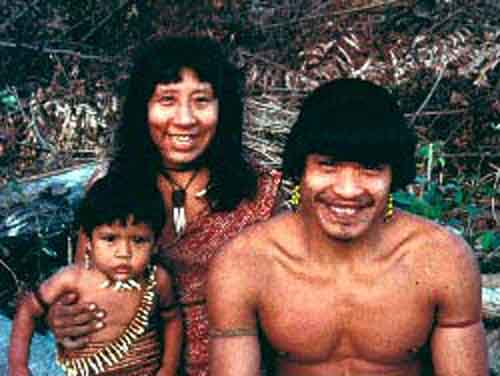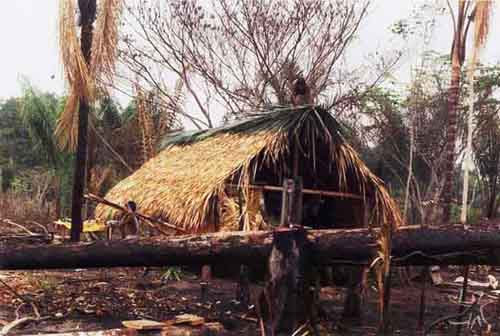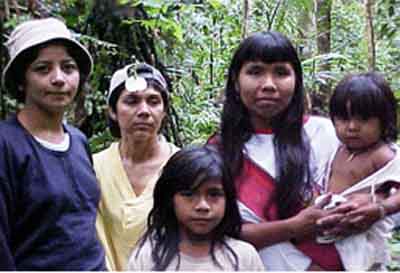

The Uru-Eu-Wau-Wau are an indigenous people of Brazil, living in the state of Rondonia. They live in six villages on the borders of Terra Indigena Uru-Eu-Uaw-Uaw, which is shared by three sub-groups, the Amondawa, Jupau, and Uru Pa In, as well as the Jururei, Parakua, and two uncontacted tribes whose names are not known. They are also known as the Amondauas, Bocas-negras, Bocas-pretas, Cabeća-vermelha, Cautarios, Soterios, Urupain, as well as Jupau, Black-Mouths, Red-Heads, Urueu-Wau-Wau.
The Uru-Eu-Wau-Wau came into contact with non-Natives, specifically the National Indian Foundation (FUNAI) in 1981, which was followed by a loss of population.
In 1981, there were 250 Uru-Eu-Wau-Wau people, but only 89 in 1993. Diseases and violent attacks by outsiders have killed them. Rubber harvesters fought FUNAI's outlines of Uru-Eu-Wau-Wau lands.
In 1991, one of the world's largest known tin deposits was discovered in Uru-Eu-Wau-Wau lands.
After 1993 their population began increasing again. The Terra Indigena Uru-Eu-Wau-Wau was established by the Brazilian government to protect the tribes and only Indians can legally live in the Indigenous Territory; however, loggers and miners have regularly invaded their lands. Missionaries are active among the Uru-Eu-Wau-Wau, and an NGO called Kaninde is trying to fight outside influences and assimilationists on the Uru-Eu-Wau-Wau.
The Uru-Eu-Wau-Wau speak the Uru-Eu-Wau-Wau language, a Tupi–Guarani language, Subgroup IV. The language is also known as Uru-Eu-Uau-Uau, Eru-Eu-Wau-Wau, Ureuwawau, or Kagwahiva, and its ISO 639-3 language code is "urz".

The Uru-Eu-Wau-Wau are hunter-gatherers. They use a poison made from tree bark on their arrows when hunting tapir and other game. They are known for their distinctive tattoos around their mouths made from genipapo, a black vegetal dye.
'Time' not necessarily deeply rooted in our brains PhysOrg - May 21, 2011

Hidden away in the Amazonian rainforest a small tribe called the Amondawa have successfully managed what so many dream of being able to do – to ignore the pressures of time so successfully that they don't even have a word for it.
It is the first time scientists have been able to prove 'time' is not a deeply entrenched human universal concept as previously thought.
Researchers, led by Professor Chris Sinha from the University of Portsmouth Department of Psychology, studied the way in which time was talked about and thought about by the Amondawa people of Brazil. Their research is published in the journal Language and Cognition.
Professor Sinha said: "For the Amondawa, time does not exist in the same way as it does for us. We can now say without doubt that there is at least one language and culture which does not have a concept of time as something that can be measured, counted, or talked about in the abstract. This doesn't mean that the Amondawa are 'people outside time', but they live in a world of events, rather than seeing events as being embedded in time."
Team members including linguist Wany Sampaio and anthropologist Vera da Silva Sinha, spent eight weeks with the Amondawa researching how their language conveys concepts like 'next week' or 'last year'. There were no words for such concepts, only divisions of day and night and rainy and dry seasons. They also found nobody in the community has an age. Instead, they change their names to reflect their life stage and position within their society, so that for example a little child will give up their name to a newborn sibling, and take on a new one.
Professor Sinha said: "We have so many metaphors for time and its passing – we think of time as a 'thing' – we say 'the weekend is nearly gone'; 'she's coming up to her exams'; 'I haven't got the time', and so on, and we think such statements are objective, but they aren't. We've created these metaphors and they have become the way we think. The Amondawa don't talk like this and don't think like this, unless they learn another language.
"We didn't expect to find this - we had studied the same language earlier and were going back to further our understanding of its metaphors. We were surprised to find that space metaphors for time and the abstract concept of time are simply absent from the language and culture.
ANCIENT AND LOST CIVILIZATIONS